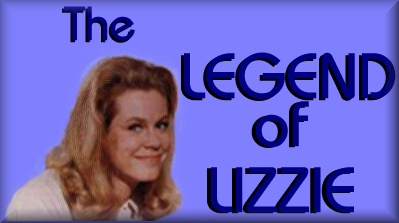|
Submitted
by: Windjammer
from The Advocate
By Robrt Pela
July 30, 1992
A certain crest portrays a woman in a Grecian robe standing on an
ocean wave, an anchor in one hand and a man's head in the other. The
crest is inscribed with the motto "Garde Bieh." Montgomery adheres to
this credo, keeping her private life well guarded and taking care in
her dealings with the press. "I grew up in Hollywood," Montgomery observes,
"so I've seen what kind of damage loose talk can do."
Her father, the late actor Robert Montgomery, discouraged her from
pursuing a career in acting, but after attending the Academy of Dramatic
Arts in New York, she made her debut in 1951 on her father's television
show, Robert Montgomery Presents. Her first theater review, for
her work in an off-Broadway production of Late Love in 1953,
mentioned her "perky nose and two perky buzzooms."
She married twice (to casting agent Fred Cammann and then to actor
Gig Young) and worked steadily in movies throughout the '50s. She had
stacked up nearly 200 television appearances by the time she met director
William Asher in 1963. They married that same year and began shopping
for a project on which they could both work. Bewitched debuted in 1964,
ran for eight seasons, and made Montgomery a star.
She received five Emmy nominations for her work on the show, a suburban
sitcom about a 300-year-old witch who stifles her sorcery to please
her neurotic, mortal husband. Asher directed his wife in more than half
of the show's 254 episodes. They had two sons and divorced in 1974.
HB Editor's Note: They also had a daughter, Rebecca.
Montgomery has had starring roles in numerous television movies
since Bewitched left the air in 1972, including her memorable
portrayal of the infamous ax-wielding heroine of The Legend of Lizzie
Borden in 1974. She met actor Robert Foxworth on the set of Mrs.
Sundance that year; they've lived together ever since and occasionally
work together, most recently in the 1992 drama, With Murder in Mind.
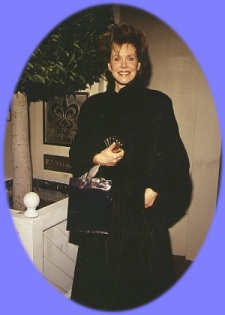
Montgomery
in the 1990s
A longtime supporter of gay causes, Montgomery publicly championed
the decision of her friend and Bewitched costar Dick Sargent
to come out late last year. "In or out of the closet, I love him," she
told The ADVOCATE at the time. On June 28 she and Sargent acted as co-grand
marshals of Los Angeles's gay-pride parade.
ADVOCATE: You don't usually do interviews. Why not?
"I have had a couple of run-ins with magazines where the reporters
were wildly insensitive and were not very nice. Like People
magazine. I think they treat people badly. I never do interviews with
people like that."
ADVOCATE: Dick Sargent was outed in an article in the Star.
"That nasty magazine. He's such a wonderful guy, and they treated
him horribly. I find that appalling. I wish there was some way I could
get to people and say, "Please, if you want to read that kind of nonsense,
read it in the grocery store. But don't buy it." Outing Dick was a
cruel thing to do, but the end result was OK."
ADVOCATE: Did you always know he is gay?
"From the minute I met him. We didn't talk about it for some time..
and it was never this big conversation. I decided that it was his
business, and I wasn't about to intrude or give my opinion. Sometimes,
that's what being a friend is all about."
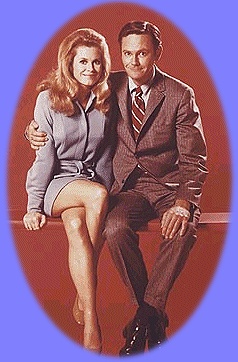
Montgomery
and Sargent Were Married on Bewitched
ADVOCATE: Do you think it is easier for actors to come out today?
"I really don't think so. I think it's going to be a long, tedious
process. There's still a lot of prejudice out there and a lot of fear
and ignorance. It's sad. Add hypocrisy to that list: Hollywood is
practically run by gays. Hypocrisy and homophobia aren't only in Hollywood.
But in this town, everything is based on earning money. If you are
trying to make films or television for the public, there are people
out there who are going to say, "I'm not going to see that film if
it's got a faggot in it." That's so awful. I wonder sometimes, what
if people had heard Rock Hudson or Brad Davis was gay before he died?
How would it have affected their careers? What if it hadn't? That
would have been great. But their fear kept them from finding out."
ADVOCATE: How do you feel about outing?
People who are open about their homosexuality, who handle being
gay better than others, seem to be the ones who are very gung ho about
outing people, no matter who it hurts. They think, "Well, I've done
it, and others can and should. That annoys me because I think you
have to consider the person and their circumstances. I know people
in this town that it would be interesting if somebody were to out
them."
ADVOCATE: Interesting how?
"Because I think once they were outed, they would be a lot more
valuable to society and themselves..."
ADVOCATE: And gay people.
"Exactly. They would be more productive on gay issues than they're
being right now. But I bump up against the whole privacy thing, and
that's where outing bothers me. I don't know that I have much objectivity
there, because I am such a private person myself. Ultimately, I think
it isn't anybody's business what anyone else does."
ADVOCATE: If one of your sons told you he is gay, would you
support him in coming out?
"I'd probably recommend it. I'd want to know why he wouldn't want
to, just as I would with anyone else. With so many of our close friends
being gay, the support system would be there."
ADVOCATE: You grew up in Hollywood, where your father must have
worked and socialized with a number of gay people. At what point were
you first aware of homosexuals?
"I can't even remember. Gay people have always been part of my
life. They've just always been there. I mean, I met. Noel Coward when
I was 5 years old. I remember sitting on the piano bench between Mr.
Coward and my grandmother and singing along with them."
ADVOCATE: Tell me a Coward story.
"Daddy was doing the film version of Private Lives, playing
the role that Mr. Coward originated in his play. Daddy was having
dinner at Sardi's one night, and in walked Noel Coward. And he screamed
across the restaurant at Daddy, "Hello, gorgeous!" and went up and
kissed him full on the mouth. People were cheering. I grew up with
that kind of thing."
ADVOCATE: Dan Quayle recently bashed Murphy Brown for having
a child out of wedlock. But in the '60's on Bewitched, Agnes Moorehead
was occasionally shown smoking something out of a hookah. I don't recall
Hubert Humphrey issuing proclamations about Endora.
"The vice president then was brighter than the one we have now.
Dan Quayle is like Mr. Potato Head. When I first heard about all this
Murphy Brown mess, I said, "Oh, the poor fellow. He just doesn't
realize that Murphy Brown is a fictional character." But I wasn't
surprised. He's trying to get the spotlight, and I wish him well."
ADVOCATE: Where do you think Quayle's press agents are?
"They're ironing his pants. You know, we can sit here and giggle
about Dan Quayle, but it's really scary that a person like that is
in a position of power. His whole thing about family values...I'm
not quite sure where all that's coming from. Family values apply whether
you're gay or straight."
ADVOCATE: After all these years, are you tired of talking about
Bewitched?
"I know this sounds disgustingly Pollyanna, but working on Bewitched
was like being in college for eight years and learning about what
I really loved and really wanted to do. How the hell could I not want
to discuss it?
We had an incredible cast: Agnes Moorehead, Marion Lorne, Maurice
Evans, Paul Lynde...just an incredible group of people. I had a grand
old time. I will admit to one thing: I did get a little tired of Samantha
being sweet and adorable all the time. That's why I invented Serena."
ADVOCATE: Samantha's groovy twin cousin.
"Yes. Paul Lynde never liked Serena. When I worked with him as
Samantha, we got along just great. The minute Serena walked on that
set, it was like competition. I asked him once, "Is it her wild wardrobe?
You can borrow it any Saturday night!"
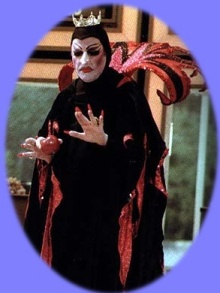
Lynde
Got his Chance to Camp It up by Playing
the Evil Queen on Storybook Squares
ADVOCATE: Bewitched is sort of a gay allegory: the story
of a different person in this case, a witch who's being told that she
can't tell anyone who or what she really is. It's the ultimate closet
story.
"Don't think that didn't enter our minds at the time. We talked
about it on the set certainly not in production meetings that this
was about people not being allowed to be what they really are. If
you think about it, Bewitched is about repression in general
and all the frustration and trouble it can cause. It was a neat message
to get across to people at that time in a subtle way."
ADVOCATE: You worked with a number of gay people on Bewitched.
Can you talk about the rumors that Agnes Moorehead was a lesbian?
"I've heard the rumors, but I never talked with her about them.
I don't know if they were true: It was never anything she felt free
enough to talk to me about. I wish, one way or another, that Agnes
had felt she could trust me. It would have been nice. She was a very
closed person in many ways. We were very fond of one another; but
it never got personal."
ADVOCATE: You're sort of a gay icon.
"I am? I have absolutely no idea why. Don't you have to be a hundred
years old to be an icon?"
ADVOCATE: Well, you haven't graduated to the point where
drag queens are impersonating you.
"Well, how would they dress? Although Harvey Fierstein told me
once that he used to do Lizzie Borden in his act."
ADVOCATE: Would you play a lesbian in a film?
"Absolutely. I think it might be very interesting. It's been
discussed. Nothing specific, but I've been asked if I'd be interested
in playing that kind of role."
ADVOCATE: Are you concerned that your involvement in the
gay-pride parade will lead people to believe you're a lesbian?
"[Laughing] I'm really not worried about that. There are bigger
things to worry about. Like the presidential election and finding
a cure for AIDS. I did the parade in support of Dick. I mean, in the
end, didn't we all?"
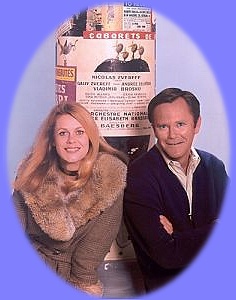
|
